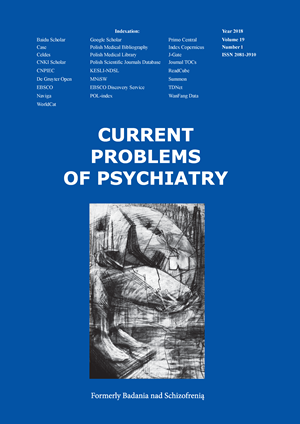The dynamics of structural changes in the social-role attitudes of students during studies at higher educational institution
DOI:
https://doi.org/10.1515/cpp-2018-0002Keywords:
personal-professional development, professional consciousness, attitude, social-role attitudes, psychological trainingAbstract
The purpose of the paper – to present the theoretical considerations and the results of empirical study concerning on the intentional characteristics of professional consciousness (on the example of social-role attitudes of students). The structure, the dynamics of changes in the social-role attitudes of students during studies at higher educational institution in different forms of studies (full-time and part-time) and the influence of the quality of program content transferred during the education process on the shaping of students' professional awareness were also discussed.
The methodology of the research. We used the method of questioning and incomplete sentences in the research. The sample consisted of 94 students of 1 - 5 courses in the following fields: psychology, primary education, mathematics and physics. The study involved 17 part-time students and 77 full-time students. The age of full-time students was from 17 to 22 years old, and the age of part-time students was from 24 to 35 years old. Methods of mathematical statistics are used to evaluate the data.
The results of the research. The data of the empirical research of the students' social-role attitudes show that they have content peculiarities as for the specifics of manifestation at different stages of professional training and on different forms of studies at higher educational institution. Social attitudes regarding the role of “student” and the role of “professional” which have threecomponent structure (cognitive, emotional and behavioural) vary in degree of awareness and completeness, and are ambivalent. This increases their resilience to changes.
The discussion. The results of the studies show that the social-role attitudes undergo changes as a result of target influences in the process of professional training of future specialists at higher educational institution. Therefore, the definition of social-role attitudes features will contribute to the development of the effective technologies in the professional training of specialists.
References
1. Meshko H. M. (ed.) V. V. Kravets: Preparation of future teachers to the preservation and strengthening of the professional health: [monograph]. Ternopil, TNPU by V. Hnatyuk, 2012: 468.
2. Guslyakova N. I.: Psychological mechanisms of formation of the professional consciousness of the future teacher: author’s abstract. dis. of PhD, Samara, 2010: 40.
3. Yadov V. A.: On the dispositional regulation of social behavior of a person. Methodological problems of social psychology: ed. E.V. Shorokhova. Moscow, 1975.
4. Akopov H. V.: Diagnostics of the professional consciousness. Psychology in high school, nr 4, 2004: 3 -38.
5. Kolomynskyi N. L.: Psychology of management in education (sociopsychological aspect: monograph. Kyiv, MAUP, 2000: 286.
6. Panok V., Titanenko T., Chepeleva N., etc.: Fundamentals of Professional Psychology, ed V. Panok, Kyiv, Lybid, 2001: 536.
7. Petty R. E., Wegener D. T.: Attitude change: Multiple roles for persuasion variables. Gilbert D.T., Fiske S.T., Eindzey G. The Handbook of Social Psychology, New York, McGraw-Hill, 1998, Vol. 1:323-390.
8. Tesser A., Martin E., Mendolia M.: The impact of Thought on the attitude of extremity and attitude-behavior consistency. Petty R., Krosnick Attitude strength: Antecedents and consequences, Ohio State University series on attitudes and persuasion, 1995, Vol. 4. Mahwah, NJ: Lawrence Erlbaum Associates: 73-92.
9. Zelinskaya T. M.: Ambivalent person. Theory, diagnostics and psychocorrection. Kyiv, Karavela, 2010:256.
10. Harrison A.A.: Individuals and groups . Monterey, Calif , Brooks / Cale, 1976.
11. Bekh I. D.: Education of the person: In 2 books. Book 1: Personalityoriented approach: theoretical and technological principles: teaching method. Edition. Kyiv, Lybid, 2003.
12. Miasyshchev V. N.: Psychology of relationships, Moscow, 1995.
13. Andreieva H. M.: Actual problems of social psychology. [MSU by. M. V. Lomonosov Moscow State University Faculty of Advanced Studies. Faculty of Psychology]. Moscow,Publishing House of Moscow State University, 1988.
14. Shevchenko N. F.: Professional Consciousness of a Psychologist: Methodological and Applied Aspect. Problems of Contemporary Psychology: Science works collection Institute of Psychology named by H. S Kostiuk NAPS of Ukraine; The State Higher Educational Establishment «Zaporizhzhia National University», nr 1, 2012: 16-23.
15. Yevdokymova N. O., Shvalb Yu. L.: Educational training as a technology for training of a specialist in the university. Scientific bulletin of Mykolaiv state university named after V. O. Sukhomlynskyi. Series: Psychological sciences: a collection of scientific works. Mykolaiv, V. O. Sukhomlynskyi National University of History, 2011. Tom 2. Issue. 7: 121-217.Correspondence address
Downloads
Published
Issue
Section
License
Copyright (c) 2018 Author

This work is licensed under a Creative Commons Attribution-NonCommercial-NoDerivatives 3.0 Unported License.


